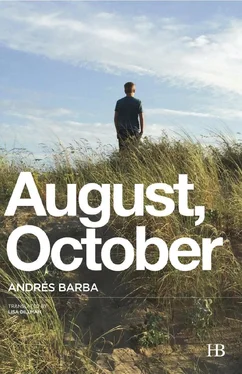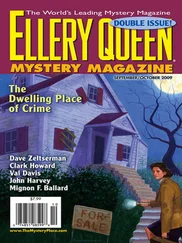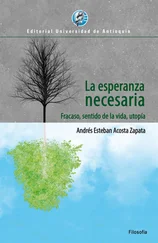He ate lunch by himself and then went out to the dunes. He wanted to go back, to see — even if it was just one last time — the place where it had all taken place, but finding it was less straightforward than he’d imagined. He remembered where they’d first seen her, so he went there and then tried to reconstruct the route they’d taken. The estuary smelled bad that afternoon and the tide was high, the sky had clouded over again. After two hours the whole town was deprived of light and had become a mildly spiritless, hostile place, less real than when it was sunny. It disconcerted him not to be able to find the spot, but all he could remember clearly was a slightly bowed pine tree and a clearing in the sand with some low brush. The dunes were full of places that could have been that place, but each one had some detail that left him unsure. He did, however, find the place he’d been with Frani that first night; he saw the stump she had sat on, and he stayed there for a few minutes. At times it seemed as though all of the dunes, as one, were furling and unfurling around him, like some dreamlike sequence in a children’s story.
He walked back to town feeling a keen wistfulness for his house, his parents, Anita. He supposed that at that time of day, the three of them would be home, waiting for him to turn up, calling his friends, and that they wouldn’t sleep that night and wouldn’t have slept the night before. How many times would they have read his note by that point? Ten times? A hundred? Searching continuously for some sign, interpreting and reinterpreting as if each sentence were pregnant with meaning, with valuable information. He regretted not having written it in a more soothing tone. It started to drizzle. He went back to Aunt Eli’s.
It was an endless evening, an endless night, and when the light was finally all the way gone, the house scared him once more. He heard sounds he didn’t recognize, sounds coming from the kitchen. He actually said aloud, “There’s someone in the house.”
He didn’t know if he said it in an attempt to keep it from being true or to make it true. In the darkness, he tried to think of Marita. Even that suddenly seemed strange — the idea of Marita. He’d constructed for himself, over the course of those two months, an idea of Marita that might have nothing to do with the real Marita; he’d invented her in a haphazard fashion, through trial and error, and made of her a mold. And the mere fact of having spent one day in that town in autumn had eroded a bit of his constructed truth, and what’s more, seen now in its true light, he wasn’t even sure his trip actually made any sense. He saw himself as if he were standing in an imaginary doorway, his hair ridiculously combed, smiling, holding out a bouquet of flowers nobody asked for, offering them to a girl who, in all likelihood, would run away if she saw him. Having the actual town as a backdrop nullified his fantasy, immediately coarsened it, subjected it to rules unknown to him. What exactly was he planning to do when he saw her? When he asked himself that, not in his imagination but actually asked aloud, trying to make the image as true as possible, he heard a sort of old-timey pantomime music, and felt an almost childish fear that would not be able to offset her real face, her real breasts, her lips — a fear that everything that was the true Marita would stifle the impulse that had made him come down from Madrid to begin with, the urge that, from a distance, had seemed so pressing. The whole night was charged with the senseless sensation that something that had never before taken place was going to occur, something his imagination could never even have begun to imagine during the daytime.
“There she is,” he said to himself, his heart in his throat, “ right there .”
It was nearly dark, and he’d spent that whole second day wandering around town searching for her, first diligently, then dejectedly. He’d been on the verge of going to a call shop to phone home but then promptly realized they’d be able to figure out where he was from the phone number. It was almost nighttime again, and a little cold. The damp had given him a chill, and he thought that if he didn’t get back to Aunt Eli’s, he’d end up getting sick.
She was sitting on a little bench in front of the supermarket, two or three plastic bags at her feet, staring at the automatic door as it opened and closed, as though she were waiting for someone. He wasn’t even sure it was her until he got a few feet closer. She was wearing a brown, corduroy skirt and a blue sweater with a huge cat face embroidered on the front, her hair was longer and pulled back in a ponytail that was too high, almost on the very top of her head. She was so ugly it embarrassed him, embarrassed him in a compassionate and almost painful way — the same way he’d occasionally felt when someone he cared about made a fool of themselves in front of people who’d be harsh and judgmental about it. Autumn had passed over her, as it had everyone, and yet rather than being affected the way others were, she seemed bizarrely removed, exhibiting the simpleminded rusticity of a country girl. Her eyes were much smaller than he remembered; they were different eyes, diminutive, like thin, horizontal lines, two notches cut into the rough skin of her face. His heart began to pound furiously, and he thought his voice was going to tremble the second he opened his mouth. He was absolutely certain it was all going to be a complete failure. He took several steps toward her and then stopped, daunted. He didn’t know where to start. She turned to him.
“Hello.”
“Hello.”
But nothing on her face altered.
“Do you remember me?”
And then he got the feeling that something was spilling over her expression, spreading through and filling it, like a cloud of milk in a cup of tea. Seriousness settled onto her face and then turned inward, something within her was collapsing noisily, but her insides continued silent and static.
“Yes,” she replied gravely, “you’re the boy from summer.”
“I came down from Madrid.”
His legs began to tremble. The two of them were in a slightly awkward position — she was still sitting, he was standing beside her. In a way his nervousness felt akin to falling asleep; suddenly he saw a different landscape, a different planet, one on which everything was unreal, with the exception of Marita.
“Why?”
“Because I wanted to see you.”
He bore the weight of that silence for a second, gathering his strength, and thought, Now I’ll tell her everything . And then, immediately afterward, Tell her. . what ? Marita didn’t seem surprised by the news, but nor did she seem indifferent. It was impossible to know what was going on inside her head.
“Did your aunt die?”
“Yeah, she died in the end.”
“Poor thing.”
And then more silence, which Marita broke.
“Frani’s not here. She left town.”
“I didn’t come for Frani, I came to see you.”
“Me?”
“Yeah, about what happened this summer.”
“Oh, that.”
And the oddest thing — it was as though she were suddenly disappointed, or ashamed, about something. Not something to do with him, but herself. He got the sense that she had resigned herself, and that that was normal behavior for her, part of her character, as if she simply took certain events and meticulously wrapped them in brown paper and then deposited them on shelves in something like a basement.
“But you didn’t do anything.”
He thought he was going to cry. He clenched his jaw as hard as he could; he’d have liked to break his teeth. And after a silence, Marita insisted.
“You didn’t hurt me.”
Her intellect seemed to be racing through an enormous space at dizzying speed, and he thought that adapting to her, to Marita, must be like adapting to that motionless speed, like a gyroscope’s. She began twisting the handles on the plastic bags, glancing at the supermarket entrance. She’d hung her head, and since he was still standing, he couldn’t see her face. Marita’s shoulders were tense and burly, her spine slightly curved. He placed a hand on her shoulder, and she leaned forward. To him it was like a punishment for her to do that. But then she immediately stood, leaping up all at once, and made for a woman just emerging from the supermarket with several shopping bags, a woman who looked to be about forty.
Читать дальше












